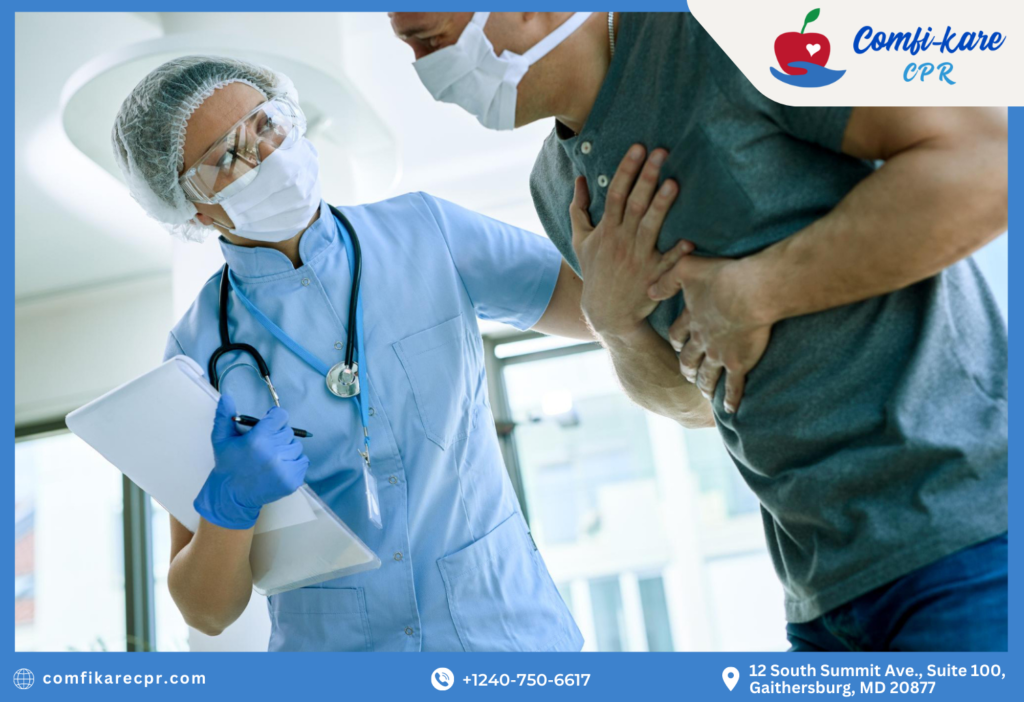
Heart attack and sudden cardiac arrest are often considered as the same medical emergency by people but they both affect the heart’s functioning differently. A heart attack occurs when the blood flow to the heart is obstructed while sudden cardiac arrest is caused due to electrical malfunctionality of the heart. The heart stops beating completely. Many people survive the heart attack but very few people survive the cardiac arrest. However, both medical emergencies are related to health and require immediate aid. In this blog, we will explore what’s the difference between a heart attack and a sudden cardiac arrest comprehensively.
Which is more severe: Heart Attack or Cardiac Arrest
A heart attack is caused when one or more of the coronary arteries ( blood vessels that provide the heart with oxygen-rich blood) are blocked. The blockage occurs due to blood clots forming in the artery which hinders the artery to supply oxygen-rich -blood to the heart. The part of the heart which encounters faces a lack of blood supply begins to die.
If the person gets emergency treatment within 90 minutes after a heart attack, the chances of survival increase significantly. The mortality rate is less than 5 percent in such cases.
Cardiac arrest is a medical emergency caused when the sudden, unexpected loss of electrical heart function, breathing, and consciousness occurs. The blood flow to the brain and other vital organs ceases immediately.
If the person is not treated immediately, structural brain damage or even death can happen, within a matter of minutes. In some cases, a heart attack might also lead to cardiac arrest. Cardiac arrest is one of the most common reasons for deaths worldwide. Every year 365,000 Americans suffer from cardiac arrest, 95% of which are unable to survive. Cardiac arrest is more severe than a heart attack, however, both medical emergencies are life-threatening and need emergency treatment.
Warning signs of Cardiac Arrest and Heart Attack
However, cardiac arrests are sudden and unexpected but these three major signs that might indicate a cardiac arrest are sudden loss of consciousness, lack of pulse, and no breathing. Dizziness or chest pain may also indicate cardiac arrest but they might also be related to some other diseases. Some other signs of cardiac arrest include;
- Seizes (Often in arms or legs)
- Feeling nausea or vomiting about an hour before the event
Three signs pointing towards a heart attack that is not present in cardiac arrest include radiating pain, feeling faint, and jaw or neck discomfort. Some other warning signs of a heart attack include;
- Squeezing chest pain or pressure
- Problem in breathing
- Excess Sweating
- Stiffness in chest
- Pain spreads to different body parts including shoulders, neck, arm, or jaw
- Sudden dizziness or brief loss of consciousness
Importance of Life Support Skills in either medical emergencies
Both heart attack and cardiac arrest are life-threatening emergencies, and if not treated immediately, the suffering person may lead to death. If you have basic life support skills, you can assess and treat such medical emergencies within time to save a life.
Learn Advanced Cardiac Life Support Course With Certification
If you are someone who wants to learn advanced cardiac life support or a medical practitioner who wants to be a certified expert in providing advanced cardiac life support, you are at the right place. We are an American Heart Association-certified organization providing individuals with advanced cardiac life support courses, to give necessary aid in medical emergencies. We provide coaching classes right at your doorstep, saving you time and money in travel. You get a certificate for completing the course which is applicable everywhere. We provide ACLS courses in Gaithersburg and Maryland. You can contact us to get more details about the course and certification.



